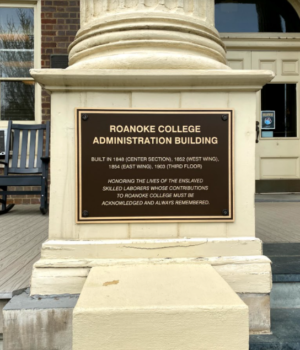Written by Devon Mitchell
On Thursday, April 8, Roanoke College unveiled two plaques on the front of the Administration building honoring the slave labor that went into building the campus. The college held a ceremony including speeches from President Maxey, Chaplain Chris, and student leaders.
The ceremony opened with a prayer and speech from Chaplain Chris, calling on the school to continue working to recognize the whole truth of the narrative of the black voices which are a part of Roanoke’s history. The Chaplain then introduced President Maxey, who gave a history of how the school’s buildings were actually built. Specifically, the two slaves who were bricklayers that built up the Administration building were memorialized. Following President Maxey’s speech, students from the Black Students Alliance and the Student Government Association helped to unveil the plaques that were placed on the pillars on the front of the Admin building.
After the unveiling, President Maxey asked BSA President Jordan Robinson and SGA Vice President Devon Mitchell to speak on what this momentous occasion meant to them.
Miss Robinson thanked the college for beginning to recognize the slave labor which went into building the school. She spoke of the candlelit vigil BSA hosts to honor those slaves and how that and the plaques were a start.
“These are mere steps in order to rectify and acknowledge that without the work of these men and women, our College could not afford buildings of this caliber,” said Robinson.
The BSA President concluded her speech by remembering the work that there is still to do, reminding us that it will take time. Robinson recalled President Maxey saying, “I would rather take my time and get it right than to rush it and be wrong.”
Mitchell noted the meaning behind the plaques and how Roanoke will no longer “accept half truths,” and instead “hold ourselves accountable for every part of our story.”
The SGA Vice President continued to thank the students who made this possible and show appreciation for the journey the College will continue to embark on. Mitchell then noted how the college was living out Roanoke’s philosophy of “service for the general good.”
On this momentous occasion for the school, it is hard to ignore that this event alone is not enough to recognize centuries of injustice. As all the speakers said, this is only the beginning, and we must hold ourselves accountable to continue a legacy of diversity, equity, and inclusivity.




